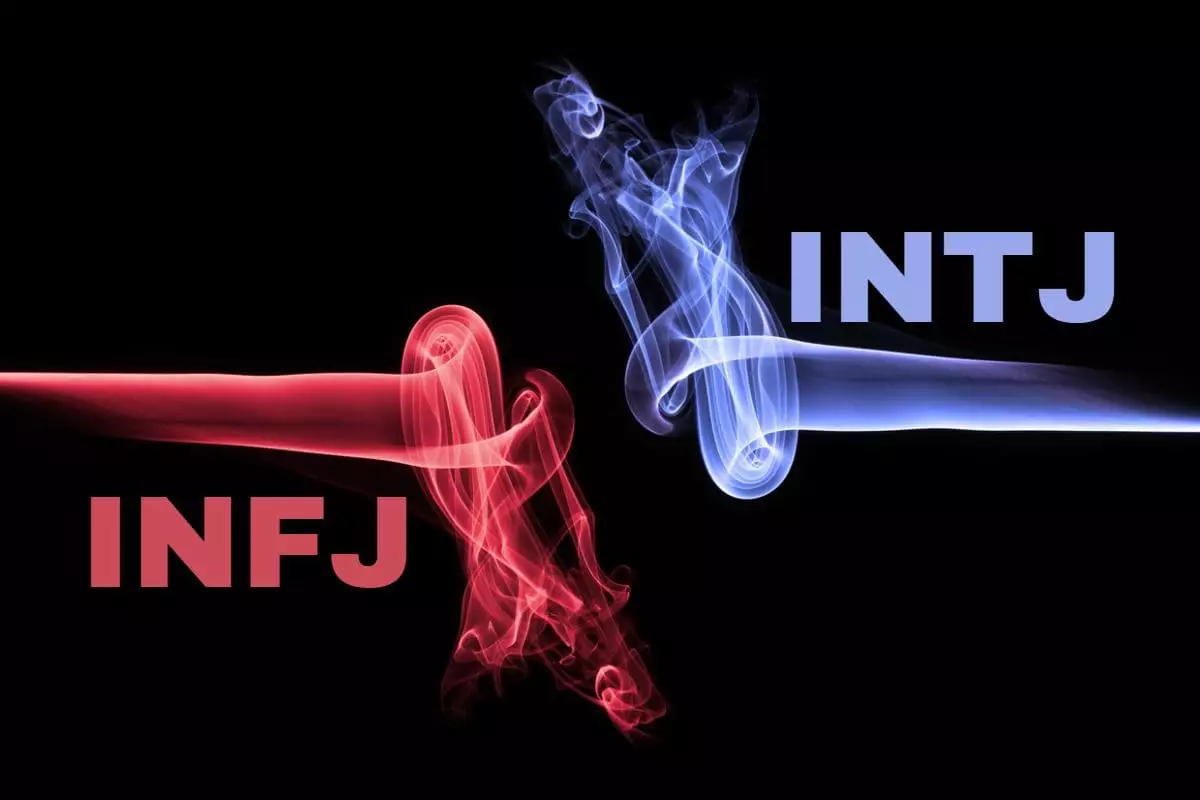When exploring the fascinating world of personality types, the Myers-Briggs Type Indicator (MBTI) stands as a useful tool for understanding individual differences. In this article, we will dive into the nuances between two similar, yet distinct, personality types: the INFJ and the INTJ.
INFJs vs INTJs? They may both be introverted and intuitive, but their decision-making and communication styles are like night and day. INFJs listen to their values and feelings, while INTJs follow their logical minds. Plus, INFJs have a warm and empathetic communication style, while INTJs are straight to the point.
Both of these types are characterized by their introversion (I), intuition (N), and judging (J) traits. The key difference lies in the way they make decisions and process information, with INFJs driven by feeling (F) and INTJs led by their thinking (T) function. This subtle distinction leads to significant disparities in their way of approaching life, problem-solving, and relationships.
Throughout this article, we will examine various aspects of these personality types in order to provide clarity on their similarities and differences, ultimately enhancing our understanding of what makes each type unique.
Personality Types Overview

In this section, we will provide a brief overview of the personality types INFJ and INTJ, exploring their unique features and highlighting some key differences between them. Understanding these personality types can provide valuable insights into personal strengths and weaknesses, as well as help enhance communication and relationships with others.
| Category | INFJ | INTJ |
| Personality Type | Advocates | Architects |
| Focus | Emotions and People | Logic and Systems |
| Decision-Making | Values and Morals | Objective Analysis |
| Communication | Warm and Empathetic | Direct and Precise |
| Leadership | Inspirational and Visionary | Strategic and Analytical |
| Working Style | Collaborative and Intuitive | Independent and Structured |
| Strengths | Empathy, Creativity, and Insight | Analytical Thinking, Strategic Planning, and Efficiency |
| Weaknesses | Perfectionism, Overthinking, and Emotional Drain | Impatience, Arrogance, and Insensitivity |
Unique Features Of INFJ
The INFJ personality type, also known as The Counselor, is a rare and complex type, making up approximately 1% to 2% of the population. INFJs are best characterized by their empathy, intuition, and idealism. They possess the following traits:
- Introverted
- Intuitive
- Feeling
- Judging
INFJs are generally seen as warm, sensitive, and caring individuals. They have a strong sense of morality, often making decisions based on personal values rather than objective logic. Furthermore, their strong intuition allows them to perceive the needs and emotions of those around them, enabling them to offer support and guidance.
Unique Features Of INTJ
The INTJ personality type, known as The Architect, is another rare and intellectually-oriented type, comprising approximately 2% of the population. INTJs are distinguished by their rationality, determination, and strategic thinking. Their primary traits include:
- Introverted
- Intuitive
- Thinking
- Judging
INTJs are often perceived as detached and analytical individuals, as they tend to prioritize reason and objectivity when making decisions. They are also skilled at identifying patterns and formulating long-term strategies, making them effective problem solvers. While they might not express emotions as openly as INFJs, they are deeply passionate about their chosen pursuits and committed to their goals.
Cognitive Functions Comparison

Dominant And Auxiliary Functions
Both INFJ and INTJ personalities share the same dominant function, which is Introverted Intuition (Ni). This function allows them to perceive patterns and explore future possibilities. However, their auxiliary functions differ. INFJs possess Extraverted Feeling (Fe) as their secondary function, while INTJs have Extraverted Thinking (Te) as theirs.
Extraverted Feeling (Fe) in INFJs drives them to focus on interpersonal relationships and harmony, making them generally compassionate and supportive. Whereas, Extraverted Thinking (Te) in INTJs leads them to prioritize logical reasoning, organization, and achieving their goals in an efficient manner.
Tertiary And Inferior Functions
The tertiary and inferior functions of INFJs and INTJs also mirror each other. INFJs have Introverted Thinking (Ti) as their tertiary function and Extraverted Sensing (Se) as their inferior function, while INTJs have Introverted Feeling (Fi) as their tertiary function and Extraverted Sensing (Se) as their inferior function.
Introverted Thinking (Ti) in INFJs helps them analyze and process information on a deeper level but may not be as well-developed as their Fe. INTJs, on the other hand, have Introverted Feeling (Fi) as their tertiary function, which enables them to have deeper emotional experiences and values but may not guide their decision-making as much as their Te does.
Extraverted Sensing (Se) is the inferior function for both types, which means that they might struggle with being fully present in the moment and adapting to sudden changes. However, over time and with experience, both INFJ and INTJ personalities can develop their Se and become more comfortable with spontaneity and external stimuli.
Strengths And Weaknesses

INFJ Strengths And Weaknesses
The INFJ personality type possesses unique strengths and weaknesses that set them apart.
- Strengths:
- Empathetic and understanding of others’ emotions
- Strong vision and drive for personal growth
- Highly creative and artistic abilities
- Weaknesses:
- Can be overly private and struggle with opening up
- Prone to perfectionism, hindering progress
- Easily overwhelmed by stress and negativity
INTJ Strengths And Weaknesses
The INTJ personality type also has its own unique set of strengths and weaknesses.
- Strengths:
- Highly analytical and objective problem-solving skills
- Independent and assertive mindset
- Long-term planning and strategic thinking
- Weaknesses:
- Difficulty connecting emotionally and empathizing with others
- Tendency to be overly critical and dismissive
- Struggles with embracing change and adaptation
Relationship Compatibility

Friendship And Family
Both INFJ and INTJ have their own unique approach to friendships and family relationships. INFJs are often more empathetic and understanding, making them great listeners and emotional supporters. They value deep, meaningful connections with those they care about.
INTJs, on the other hand, are more logical and rational. They are straightforward and prefer logical discussions. They may not exhibit the same level of emotional understanding that INFJs do, but they can still be dependable and loyal friends and family members.
Romantic Relationships
In romantic partnerships, INFJs and INTJs each have their own set of strengths and challenges. INFJs are nurturing, committed, and prioritize emotional intimacy. They seek harmony and balance in their relationships and can sometimes struggle with confrontation.
INTJs in romantic relationships excel at problem-solving, decision-making, and setting long-term goals. They may struggle with openly expressing emotions, but their actions often speak louder than words in showcasing their commitment and loyalty.
Professional Collaboration
When it comes to work environments, INFJs and INTJs can complement each other quite well. INFJs bring a strong sense of empathy, vision, and understanding of people’s needs while INTJs provide strategic and analytical thinking, and pragmatic solutions.
Working together as a team, INFJs and INTJs can achieve great results by utilizing their respective strengths in a balanced manner. However, it’s important for them to understand and appreciate their differences for a successful collaboration.
Personal Growth And Development

While both INFJ and INTJ types are committed to personal growth and development, they approach this journey with different perspectives and priorities.
INFJs focus on:
- Nurturing their emotional intelligence and empathy.
- Engaging in meaningful and deep connections with others.
- Improving their communication skills to better express their thoughts and ideas.
- Seeking spiritual or philosophical insights to enrich their personal growth.
INTJs prioritize:
- Expanding their knowledge and competency in their areas of interest.
- Developing effective and efficient strategies to achieve their goals.
- Enhancing their logical and analytical thinking abilities.
- Reflecting on their experiences and learning lessons for future decision-making.
Despite these differences in approach, both INFJs and INTJs share a strong desire for continuous self-improvement and personal growth. These intrinsic motivations enable them to face challenges, adapt to changes, and strive for a more fulfilling life.
Parting Words

In this article, we delved into the complexities of the INFJ and INTJ personality types. We explored their similarities and differences, as well as their respective strengths and weaknesses.
We found that both INFJ and INTJ share certain traits, such as introversion, intuition, and judging preferences. However, they are distinct in their emotional and rational processing, with INFJs utilizing feeling while INTJs prioritize thinking.
Understanding the intricacies between these two personality types can help us appreciate the richness and diversity of human cognition and inform our approach to personal and professional relationships.

